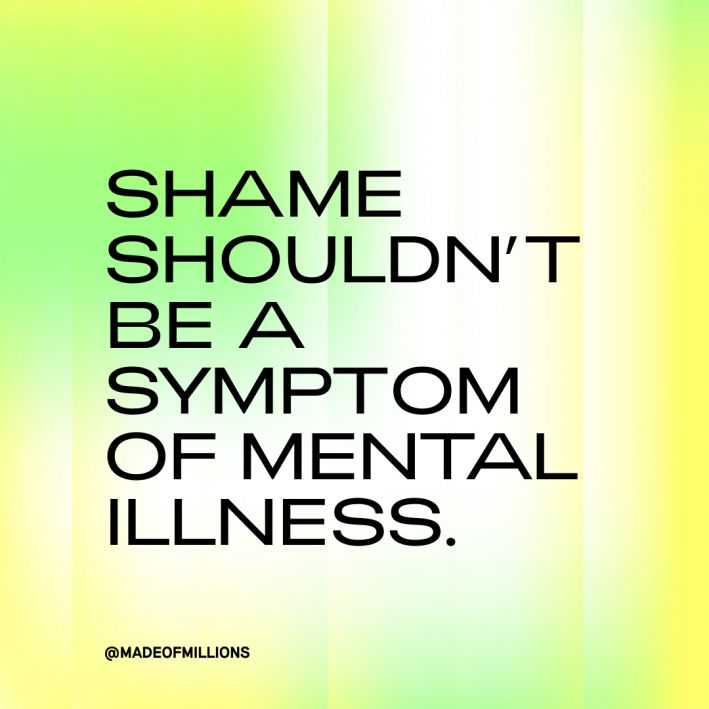Exploring Shame
What makes us feel unworthy?
Escrito por Made of Millions Team

01 56% of people say they're uncomfortable talking to loved ones about their mental health. Even those they care for and trust. Behind this discomfort, lies a common culprit: shame.
02 For mental health awareness month, we're shedding a light on shame and where it comes from with our Shame Shouldn't Be a Symptom campaign.
Shame is a complex emotion.
It’s not quite embarrassment or guilt. It’s deeper than that. For most people, it can be defined as the painful feeling or belief that we are unworthy of love, support, opportunity or respect because of who we are.
Shame makes us question our validity and value as people.

Listening to shame | Brené Brown
Researcher Brené Brown explores what can happen when people confront their shame head-on.
When we feel ashamed, we often retreat.
We pull back from hobbies. We call in sick from work or social activities. We develop poor self-esteem. We struggle to share our full selves with others.
We may become angry, irritable, anxious or unpredictable. Some of us adopt unhealthy coping mechanisms to mask our feelings of low self worth. These can include substance abuse and self harm behaviors.
When it comes to mental health, shame is often discussed as stigma. Shame and stigma are more pervasive than we realize. They don’t just manifest socially, but structurally and within ourselves.
- Structural stigma: When policies and norms lessen opportunities for stigmatized people.
- Social stigma: When negative attitudes, beliefs, or behaviors are projected onto people from their circles of influence.
- Perceived stigma: When we internalize these negative attitudes, beliefs, and behaviors, and allow them to change how we see ourselves.
From the Community
Let’s take this example:
Emily was just diagnosed with a mental disorder and prescribed medication.
Instead of being optimistic about her recovery, she’s nervous that the meds will negatively affect her productivity at work.
Her place of employment has a history of discriminating against people with mental disorders, so she keeps quiet about her diagnosis.
After work, she goes home and watches a television show that misrepresents her disorder. A friend she’s hanging out with laughs at these depictions, seemingly in agreement with them.
Before going to bed, she decides not to take her medication because she doesn’t want to be like the character on TV or risk her reputation at work.

There's No Shame in Taking Care of your Mental Health | Sangu Delle
Delle shares how he learned to handle anxiety in a society that's uncomfortable with emotions.
What do we know about shame and mental health?
- People who experience shame are often less inclined to label themselves as mentally ill and seek treatment.
- Shame can cause people to isolate themselves, leaving them without crucial support networks.
- Shame and self-injury are often intertwined, with cycles of both exacerbating one another.
- Shame can be an immediate response to our symptoms, such as feeling ashamed after a manic bipolar episode, after disclosing taboo intrusive thoughts related to OCD, or after relapsing while battling a substance use disorder.
- When family members are ill informed about mental health, speaking up can be met with negative reactions, including shaming people into silence or denying them treatment.
- Primary care physicians, social workers, teachers, and employers who are ill informed can perpetuate cycles of shame, leaving those in their care feeling misunderstood, fearful of opening up, or actively dismissed.
Shame can seem unescapable. We don’t just feel it deep within ourselves, but embedded in the relationships and environments we navigate. So how do we overcome it?
By investing in structural changes that prevent discrimination and increase access to support; societal changes that destigmatize human emotions, behaviors and needs; and personal changes that prioritize self-care and community over productivity, self-hate & denial.
When we break these categories down further, combating shame can look like many things, including:
- Creating or joining safe spaces that welcome honest conversation.
- Advocating for federal or local reforms, such as increased access to social services or workplace accommodations.
- Demanding for more accurate representations of our conditions in the media.
- Speaking up when we hear someone shaming another individual.
- Advocating for our needs and seeking help.
- Using inclusive and accurate language in everyday conversations.
- Connecting with individuals who have similar lived experiences.
- Having our feelings and identity markers validated and respected.
- Questioning why we feel ‘lesser than’ and reminding ourselves we aren’t.
As shame and mental health expert, Bréne Brown, says, “If you put shame in a Petri dish, it needs three things to grow exponentially: secrecy, silence and judgment. If you put the same amount in a petri dish and douse it with empathy, it can’t survive. The two most powerful words when we’re in struggle: me too.”
Shame shouldn't be a symptom of mental illness.
Everyone deserves to feel comfortable in their identities, experiences and differences. By being open and honest about our journeys, we allow others to feel liberated from their own shame.
When we focus on changing society rather than policing ourselves, we get closer to a world that prioritizes care over cycles of internal and external harm.
Apoya nuestro trabajo
Nuestra misión es cambiar la manera en que el mundo percibe la salud mental.
























